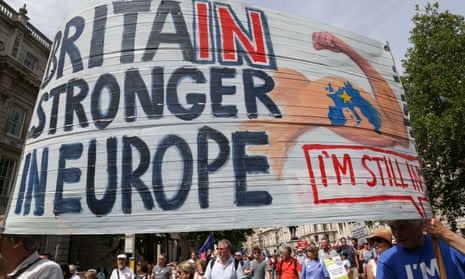It is barely disguised civil war. Brexit politicians and their powerful press are leading our country into the deepest of economic and political mires. “Fuck business” was reportedly Boris Johnson’s reaction to Airbus’s warning that it would have to disinvest from Britain unless there was a deal in which Britain continued its membership of the EU’s air safety certification system, single market, customs union and respected the jurisdiction of the European court of justice.
Airbus’s customers need to know that every component in its planes conforms to the highest safety standards, which are set by the EU. Equally, it must strain for maximum production efficiency, fighting for every last order against Boeing; parts cannot be delayed for days, even hours, subject to time-consuming customs checks. As matters stood, warned its chief operating officer, Tom Williams, none of this could be assured: there was no clarity about Britain’s economic and trading regime after the transition period in 2020. His concerns are amply justified. Johnson’s reaction, and the parrot squawk that it is all part of Project Fear and safely to be ignored, is evidence enough. In the 21st century, it takes a continent to build a plane and the continent has to have shared trade rules, common regulatory standards and accepted adjudication processes.
But Brexiters are as ignorant and locked into a pre-modern mindset as they are powerful. Theresa May presides over a government that insiders privately acknowledge is so divided that it is “ beyond salvation”. Britain is drifting towards being outside our continent’s trade and regulatory framework.
An Airbus move would be a devastating blow to jobs and manufacturing. It employs 14,000 directly and 100,000 indirectly. The wing factory in Brexit-voting north Wales employs 6,000: its workers, like those in Sunderland working for Nissan, were blinded by an avalanche of propaganda into voting for their own poverty. Nor is Airbus alone.
Days earlier, Erik Nordkamp, chair of a trade association of 10 US pharmaceutical companies based in Britain, reported that 86% of life science executives responded, in a survey, that Brexit uncertainty was imperilling investment. Our traditional dominance in the life sciences, warned Nordkamp, was under threat. As in air safety, so it is in medicine. The EU’s European Medicines Agency, now moving from Britain to Holland, sets the continent’s drug standards. Again, it takes a continent to research, prototype, safety-test and launch a drug. Outside that trade and regulatory framework, and with a NHS too cash-strapped to order new drugs, another British economic flagship is set to sink.

The car industry will join its ranks. Revitalised by foreign direct investment, the UK car industry is part of a continental-wide system of production in which we disproportionately share the higher value work. BMW, maker of the Mini, warns of how a hard Brexit will force it into expensive, wasteful mitigating measures; Tata has already announced it is moving production of the Discovery Land Rover to Slovakia, while John Neill, CEO of Unipart, declares that Brexit is a fatal threat to the car industry. And our space industry, aiming to grow to £40bn by 2030, is about to be severely wounded by being excluded from the EU Galileo collaboration.
All of this leaves the Brexiters unmoved. Johnson, Rees-Mogg and Farage think the further emasculation of British industry, in true Thatcherite style, is a price worth paying for the glittering prospect of an “independent” trade policy. But with whom, pray? Only India, the US and China are economies of any size outside the EU’s network of trade deals with 88 countries. None is gagging to do a kindly compensatory deal with Britain as a trade war looms. And to sell what, precisely, that cannot be sold now?
It becomes ever clearer what a fabulous deal Britain had with the EU. We were at the centre of a free trade, rules-based order that spanned nearly half the world’s countries – and worth up to a £1,000 a year for the average family in lower prices, estimated the consultancy Oliver Wyman. Through the EU, British concepts of regulation became world standards – from medicine to mobile phone frequencies – allowing companies such as Vodafone to grow to global dominance. Inward investment boomed, compensating for our own endemic economic weaknesses.
The EU pulled up our standards – from workers’ rights to clean air. Britain’s initiatives on trade, finance and security had real weight, backed as they were by the power of the EU. We could lay claim to being a world economic and political power. The EU was a win/win – the result of the noble cause of bringing our continent closer together.
Yet British politics is transfixed. Faragists control the Tory party, fucking business, employment and jobs as if the rules of the economic game were as they were in 1850. Meanwhile, Corbynites control the Labour party, ruining the economy no less effectively by fantasising about bespoke deals that it claims it can negotiate better than the Tories, according to which Britain can share the benefits of being part of our continent’s trade and regulatory system while being independent. In and out simultaneously. But no club anywhere works like that, as nearly every member of the parliamentary Labour party knows. It is political guff. An increasing number of MPs on both sides, trooping through the lobbies, voting for policies they know are either impossible or against the national interest, believe the only way of breaking the logjam is a second people’s vote.
Which is why yesterday I joined the march for just that: when tens of thousands freely give up their time to make common cause over a great purpose, politicians should listen. Opinion is shifting in the country and the discredited leaders of Brexit could not pull off the same combination of deceit and mendacity again. The danger is not the divisiveness of another vote; it is that it will only be the lived consequences of Brexit that make voters realise they were duped. But by then it will be too late to get back the lost factories, laboratories and headquarters. Democracy and our prosperity demand a second vote – now.

